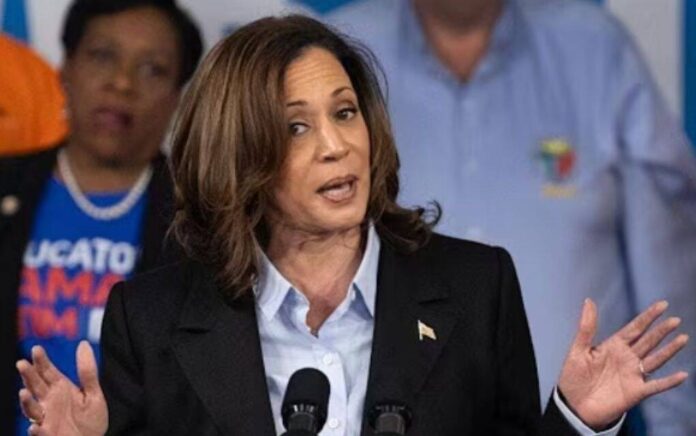
Harris has never been full of bright ideas. But this one might be her worst yet.
As a new plan by Kamala Harris could be absolutely devastating for Americans.
Vice President Kamala Harris is set to announce a significant tax proposal today aimed at boosting small businesses and startups.
If elected president, Harris plans to increase the tax deduction for startup expenses from the current $5,000 to $50,000—a move that could cost Americans up to $20 billion over the next decade, according to experts.
Harris will unveil the plan during a campaign stop in New Hampshire, focusing on how the policy can benefit small businesses.
According to a Harris campaign official, the plan would also give new businesses the option to delay claiming the deduction until they turn a profit, allowing them to lower their tax burden when it would be most beneficial.
“This proposal would also allow new businesses to wait to claim that deduction until they first turn a profit in order to reduce their taxes,” the official said.
Garrett Watson, a senior policy analyst at the nonpartisan Tax Foundation, estimates that the plan could cost approximately $20 billion over 10 years. His assessment is based partly on data from the 2010 Small Business Job Creation Act, which temporarily increased the deduction for business expenses from $5,000 to $10,000. That measure cost $230 million over a decade before the increase expired.
Watson noted that the proposed tax deduction would help startups by allowing them to fully deduct their costs from future revenue. “Generally speaking, it’s better to allow startups the space to properly deduct costs from their revenue, including against future revenue, rather than disallowing deductions for expenses or requiring lengthy amortization of those costs,” he explained.
Marc Goldwein, senior policy director at the nonpartisan Committee for a Responsible Federal Budget (CRFB), agreed with the $20 billion estimate, adding that the plan would mostly shift when businesses pay taxes. “Most of what this policy is doing is changing the timing of taxes,” Goldwein said. “Normally it’s a benefit to deduct it faster, but startup costs are sometimes different.”
Goldwein pointed out that while the plan would benefit some businesses, many may not be able to take full advantage of the deduction in their first year of operation. “A lot of businesses are not going to be able to deduct that much in the first year,” he said.
The policy has drawn a range of reactions from experts. Adam Michel, director of tax policy studies at the libertarian Cato Institute, expressed mixed feelings about the plan. “I’m glad to see Harris acknowledge that cutting taxes helps businesses,” Michel said. “The opposite is also true: raising taxes hurts businesses, big and small.”
Michel argued that the policy doesn’t go far enough, advocating instead for “full expensing,” which would allow all businesses to deduct all expenses in the year they’re incurred. He also warned that Harris’s broader tax policies, such as raising the corporate tax rate to 28%, would increase the tax burden on small and family-owned businesses.
“Instead of limiting the deductibility of small business start-up expenses to just $50,000, a better policy would be to allow all businesses to deduct all of their expenses in the year they are made,” Michel suggested, calling full expensing one of the most pro-growth tax reforms.
Meanwhile, critics like EJ Antoni, a public finance economist at the conservative Heritage Foundation, questioned Harris’s focus on new business applications. Harris hopes to see 25 million new business applications in her first term, but Antoni argues that the real issue is the survival of those businesses.
“There is no shortage of new business applications today, so it’s unclear why Harris would make that a priority,” Antoni said. “The problem today is that most businesses can’t get started or fail shortly after starting due to high costs from inflation and regulatory burdens.”
Antoni also criticized Harris’s broader economic policies, accusing her of promoting higher taxes that would contradict her small business-friendly initiatives.
“Harris wants to impose an unrealized gains tax, higher income taxes, and higher taxes on investment. If she wanted to reduce taxes on small businesses, she wouldn’t be pushing for more taxes instead,” Antoni argued.
Harris’s proposal comes alongside other economic policies she has promoted, such as a ban on purported grocery price gouging, an expansion of the Child Tax Credit, and a $25,000 subsidy for first-time homebuyers—policies some experts have warned could contribute to rising inflation.
Stay tuned to The Federalist Wire.



















